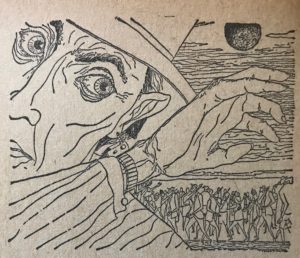 A few months back, while prepping for The International Conference on the Fantastic, I wrote a piece titled “Existential Threats” that considered how social media and digital tech were reshaping our culture. The essay centered on two sf classics, Ray Bradbury’s “The Murderer” (pictured at left) and Arthur C. Clarke’s “Dial F for Frankenstein.” Since the conference would focus on the Anthropocene, I figured the essay would fit nicely into the discussion of how technology is transforming the world.
A few months back, while prepping for The International Conference on the Fantastic, I wrote a piece titled “Existential Threats” that considered how social media and digital tech were reshaping our culture. The essay centered on two sf classics, Ray Bradbury’s “The Murderer” (pictured at left) and Arthur C. Clarke’s “Dial F for Frankenstein.” Since the conference would focus on the Anthropocene, I figured the essay would fit nicely into the discussion of how technology is transforming the world.
Then came COVID-19. The conference was canceled, and the essay is now available in the current issue of Dissections, the British literary journal edited by Gina Wisker and published out of the University of Brighton, UK. You can read the essay here.
Reflecting in the essay now — just two months after it was written — I recall a review of Michael Crichton’s novel Prey that appeared in The New Yorker some 20 years ago. The review considers how scenarios in Crichton novels tend to ignore the technological changes that follow cataclysmic events:
 [Crichton’s novels describe] things that could change the world—but don’t. The Andromeda strain of space germs mutates into harmlessness and goes away; the lost city of the Congo is wiped from the map by lava; in Sphere, the discoverers of the extraterrestrial artifact of untold power use that power to wish it into retroactive nonexistence. The fact that Crichton has no interest in showing what might have happened is what makes him a writer of suspense fiction, rather than of science fiction. A science-fiction writer would naturally want to see what would happen if the technologies stayed out of control (as most do), and might even want to ask whether the consequences would be all bad (as they often aren’t). Might not free-range dinosaurs make Costa Rica an even more interesting place than it is today? What if nanoswarms offered promise as well as peril? Prey, with its kill-them-all-and-get-out approach, is neither as frightening nor as fascinating as Greg Bear’s novelette of twenty years ago, “Blood Music,” in which the characters, transformed by the nanotechnology within them, become both far more and much less than human.
[Crichton’s novels describe] things that could change the world—but don’t. The Andromeda strain of space germs mutates into harmlessness and goes away; the lost city of the Congo is wiped from the map by lava; in Sphere, the discoverers of the extraterrestrial artifact of untold power use that power to wish it into retroactive nonexistence. The fact that Crichton has no interest in showing what might have happened is what makes him a writer of suspense fiction, rather than of science fiction. A science-fiction writer would naturally want to see what would happen if the technologies stayed out of control (as most do), and might even want to ask whether the consequences would be all bad (as they often aren’t). Might not free-range dinosaurs make Costa Rica an even more interesting place than it is today? What if nanoswarms offered promise as well as peril? Prey, with its kill-them-all-and-get-out approach, is neither as frightening nor as fascinating as Greg Bear’s novelette of twenty years ago, “Blood Music,” in which the characters, transformed by the nanotechnology within them, become both far more and much less than human.
COVID-19 will certainly be a game-changer, with the potential to accelerate the development of digital communication and redefine the elements of human interaction. Consider just a few of the news stories and op/eds running today:
- Welcome to the Skype Pandemic
- How to Make America 2.0 a More Equitable Society
- The Office As We Knew It Isn’t Coming Back Anytime Soon. Maybe It’s Changed Forever
- The Nude Selfie Is Now High Art
Clearly, digital media seems poised to change the post World War C world as dramatically as missiles and atomic energy did in the aftermath of WWII. And that’s not necessarily a bad thing.
A point I might have hit harder in “Existential Threats” is that the dooms-day scenarios of “The Murderer” and “Dial F” are best read as cautionary tales, warnings of what could happen if change is handled irresponsibly. Such stories are not predictions, and they are balanced nicely by other sf works that look beyond momentary chaos and toward the promise of a new normal.
Fasten those seat belts folks. Stay safe, healthy, and open to the possibilities lie beyond the turbulence. As characters in a science fiction novel, we have no choice but to face the current challenge and move forward into a life 2.0.

Leave a Reply